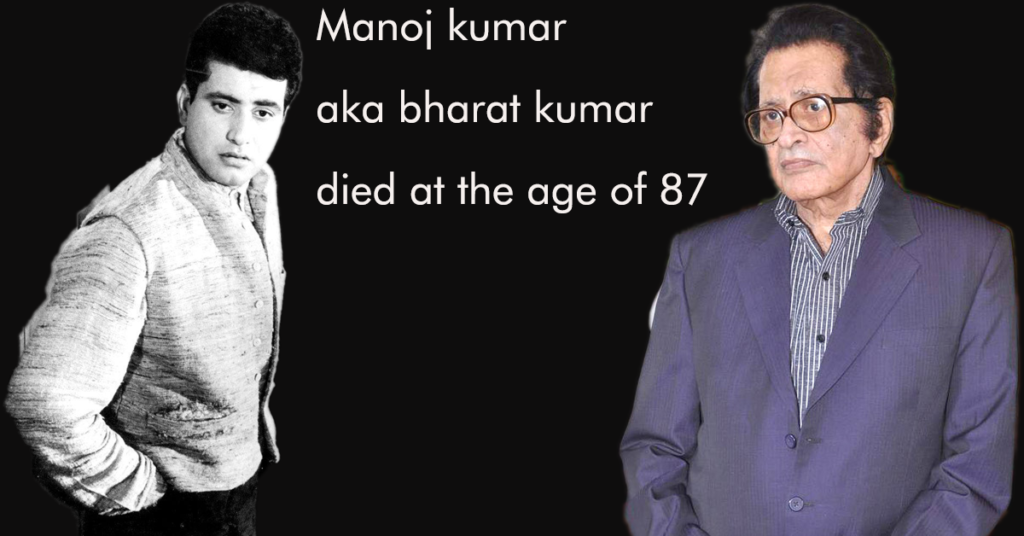
Manoj Kumar
Table of Contents
The world of Indian cinema lost one of its most iconic figures on February 24, 2024, as veteran actor-director Manoj Kumar breathed his last at the age of 87. After battling a prolonged illness, the legendary artist, affectionately known as “Bharat Kumar” for his unwavering portrayal of patriotism, left behind a legacy that continues to inspire generations. His passing marks the end of an era, but his contributions to Bollywood and his timeless films ensure his spirit lives on.

A Life Dedicated to Storytelling
Born Harikrishan Giri Goswami on July 24, 1937, in Abbottabad (now in Pakistan), Manoj Kumar’s journey to stardom was shaped by the turbulence of partition. His family relocated to Delhi during the division of India, and it was here that young Harikrishan discovered his love for cinema. Inspired by Dilip Kumar’s performance in Shaheed (1948), he adopted the screen name “Manoj Kumar” and set his sights on becoming an actor.
Manoj Kumar’s early years in Mumbai were marked by struggle. Like many aspiring artists, he faced rejections and financial hardships. His breakthrough came with Kaanch Ki Gudia (1960), but it was his role in Hariyali Aur Rasta (1962) that established him as a romantic lead. However, it was Shaheed (1965), a biographical film on freedom fighter Bhagat Singh, that transformed his career—and his identity. The film’s success earned him the nickname “Bharat Kumar,” a title that would define his cinematic persona.
https://twitter.com/ians_india/status/1908007867312918960
The Patriot Who Wore His Heart on His Sleeve
Manoj Kumar’s filmography is a testament to his love for India. At a time when Bollywood was dominated by romantic dramas and family sagas, he carved a niche by blending entertainment with social messaging. Films like Upkaar (1967), which celebrated the sacrifices of soldiers and farmers, and Purab Aur Paschim (1970), a critique of Western cultural influence, resonated deeply with audiences.
Upkaar, in particular, became a cultural phenomenon. The song “Mere Desh Ki Dharti” remains an anthem of patriotism, while the film’s protagonist, Bharat, embodied the ideals of hard work and national pride. Manoj Kumar didn’t just act in these films—he wrote and directed many of them, ensuring his vision of India’s ethos was communicated authentically.
His collaboration with lyricist Gulzar and composer Kalyanji-Anandji in Roti Kapda Aur Makaan (1974) further solidified his reputation as a filmmaker unafraid to tackle societal issues. The film critiqued corruption and unemployment, themes that remain relevant even today.
https://twitter.com/ndtv/status/1908007659753635882
Behind the Camera: A Perfectionist’s Journey
Manoj Kumar’s transition from actor to director was driven by his desire for creative control. He once remarked, “I wanted to tell stories my way, without compromises.” This perfectionism often led to clashes with producers, but it also resulted in films that were distinctly his own.
His directorial style was marked by meticulous attention to detail. For Kranti (1981), a period drama about India’s struggle for independence, he spent years researching historical events. The film, starring Dilip Kumar and Shashi Kapoor, was one of the highest-grossing movies of its time and showcased Manoj Kumar’s ability to balance scale with substance.
However, not all his ventures were successful. Clerk (1989), a satire on bureaucratic red tape, failed to connect with audiences, and Jai Hind (1999), his last directorial effort, was criticized for being outdated. Yet, even in failure, Manoj Kumar’s commitment to his craft never wavered.
The Man Behind the Legend
Away from the arc lights, Manoj Kumar was a private individual who cherished simplicity. He married Shashi Goswami in 1965, and the couple remained together for nearly six decades, a rarity in an industry often plagued by transient relationships. Their sons, Kunal and Vishal, recall their father as a disciplined yet affectionate man who valued family above all.
Colleagues often spoke of his humility. Amitabh Bachchan, who worked with him in Roti Kapda Aur Makaan, once shared, “Manoj ji never let his stardom overshadow his humanity. On set, he treated everyone with respect, from the spot boy to the lead actor.”
Despite his patriotic image, Manoj Kumar had a playful side. He was known for his love of poetry and often recited Urdu couplets between takes. Close friends like actor Dharmendra fondly remember his ability to light up a room with his wit.
Health Struggles and Final Days
In his later years, Manoj Kumar retreated from public life. Reports of his declining health began surfacing in the early 2010s, with friends revealing he suffered from age-related ailments. His last public appearance was in 2016, when he received the Dadasaheb Phalke Award, India’s highest cinematic honor.
A close family friend shared, “He faced his illness with dignity. Even when his body grew weak, his mind remained sharp. He’d often reminisce about his films and the golden era of Bollywood.”
His son Kunal confirmed that the veteran actor-director passed away peacefully at his Delhi residence, surrounded by family. “He lived a full life, one he dedicated to his art and his country. We find solace in knowing his work will keep his memory alive,” Kunal said.
Tributes Pour In
News of Manoj Kumar’s demise triggered an outpouring of grief across the industry. Prime Minister Narendra Modi tweeted, “Manoj Kumar ji’s films embodied the spirit of India. His passing is a profound loss to our cultural heritage.”
Actor Anupam Kher wrote, “He taught us how to love our country through cinema. Farewell to a true legend.” Meanwhile, veteran actress Asha Parekh recalled, “Working with him in Upkaar was a masterclass in storytelling. He was a visionary.”
Fans, too, shared heartfelt messages. Social media platforms were flooded with clips from Shaheed and Purab Aur Paschim, accompanied by hashtags like #BharatKumarForever.
A Legacy Beyond Box Office Numbers
Manoj Kumar’s influence extends beyond his filmography. He pioneered the concept of “nation-first” storytelling, a template later embraced by filmmakers like Rajkumar Hirani and Ashutosh Gowariker. His emphasis on social responsibility inspired actors like Akshay Kumar, who has often cited Upkaar as a career inspiration.
Film historian S.M.M. Ausaja notes, “Manoj Kumar wasn’t just making movies—he was crafting a narrative for post-independence India. His films mirrored the hopes and struggles of a nation finding its identity.”
Even his quirks left an indelible mark. His signature style of tilting his head in emotional scenes became a trademark, often imitated by comedians but beloved by audiences.
The Final Curtain Call
As the film fraternity prepares to bid adieu, plans for a state funeral are underway, reflecting his stature as a cultural icon. Meanwhile, television networks have announced marathons of his classics, ensuring newer generations discover his work.
In an industry often obsessed with youth and glamour, Manoj Kumar’s career stands as a reminder of the power of substance. He didn’t conform to trends; he created them. Through his films, he asked audiences to reflect on their roles as citizens, a message as urgent today as it was in the 1960s.
A Legacy of Patriotism and Cinematic Excellence
Manoj Kumar, born Harikrishan Giri Goswami in Abbottabad (now Pakistan) in 1937, rose to prominence with films that intertwined entertainment with social messages. His career-defining works include:
- Shaheed (1965): A biopic on Bhagat Singh that earned him the nickname Bharat Kumar 1.
- Upkar (1967): His directorial debut, inspired by Prime Minister Lal Bahadur Shastri’s slogan “Jai Jawan Jai Kisan,” became a national anthem of patriotism 1.
- Roti Kapda Aur Makaan (1974): A critique of unemployment and corruption, featuring Amitabh Bachchan and Shashi Kapoor 14.
- Kranti (1981): A historical epic that became one of the highest-grossing films of the 1980s
Conclusion: The Immortal Bharat Kumar
Manoj Kumar’s journey—from a partition refugee to a cinematic legend—is a story of resilience and passion. His films were more than entertainment; they were a call to action, urging viewers to uphold the values of unity, integrity, and compassion.
While the man may have left us, “Bharat Kumar” remains immortal. As long as “Mere Desh Ki Dharti” plays on radios and Shaheed inspires young minds, his legacy will endure. In the words of Gulzar, “He didn’t just depict patriotism—he lived it.”
Today, as we mourn his passing, we also celebrate a life that truly embodied the soul of India. Rest in peace, Manoj Kumar. Your nation salutes you.








1 thought on “Tribute to the Legendary Manoj Kumar: A Timeless Cinematic Legacy of Patriotism and Heart Died At Age of 87”